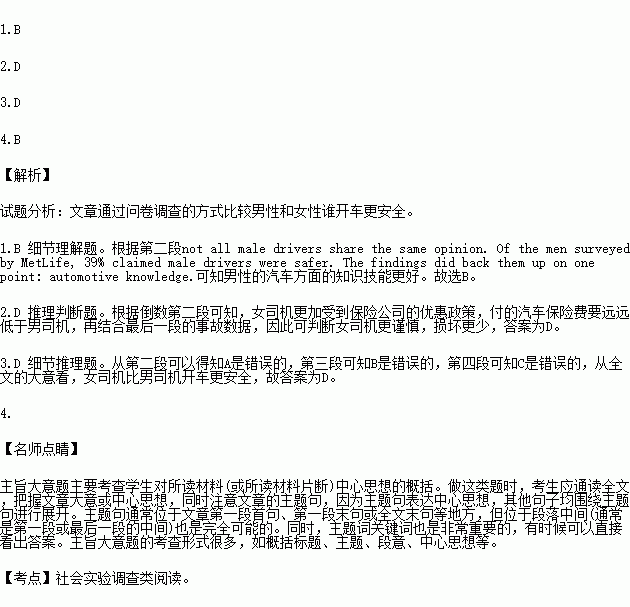题目内容
People always think men are more skilled than women in driving. Nowadays women appear to have a positive image of themselves as safer drivers than men.
In a survey done for insurer MetLife, 51% of women said they drive more safely. The evidence is on their side: Men are 3.4 times more likely than women to get a ticket for careless driving and 3.1 times as likely to be punished for drunk driving. “Women are on average less aggressive and more law abiding (守法的) drivers, which leads to fewer accidents.” the report says. However, not all male drivers share the same opinion. Of the men surveyed by MetLife, 39% claimed male drivers were safer. The findings did back them up on one point: automotive knowledge. The report showed that more men are familiar with current safety equipment such as electronic stability control, which helps prevent rollover accidents.
Auto safety unavoidably matters to money. Insurance companies focus on what classes of drivers have the lowest dollar amounts of claims, and for now, that mainly includes women. In general, women pay about 9% less for auto insurance than men. A study by the website Insweb also showed that auto insurance rates are lower for women in most states. Among individual states, women get the greatest advantage in Wyoming (where they pay 20% less), South Dakota and Washington, D. C., where their insurance costs are 16% lower.
“More than 11,900 male drivers died in U.S. traffic accidents in 2009, compared with just under 4,900 women drivers,” according to the study. “Based on miles traveled, men died at a rate of 2.5 deaths per 100 million miles traveled, v.s. 1.7 deaths for women.”
1. According to the study, male drivers _________.
A. are less aggressive while driving
B. are more skilled at auto knowledge
C. are more likely to stick to driving laws
D. are less familiar with safety equipment
2. Insurance companies focus on female driver clients(客户) probably because they _________.
A. cause more accidents on the road but ask for little
B. cause little damage and pay more money to the insurance companies
C. make up the most part of the insurance clients
D. are more careful drivers and cause less damage
3. We can infer from the passage that _________.
A. men are 3.1 times more likely to get tickets than women
B. all women in the USA pay the same for their auto insurance
C. more female drivers die every year than male drivers
D. women are generally safer drivers than the opposite sex
4. The writer mainly develops paragraphs by _________.
A. giving examples B. making comparisons
C. drawing a conclusion D. presenting an argument
 阅读快车系列答案
阅读快车系列答案
